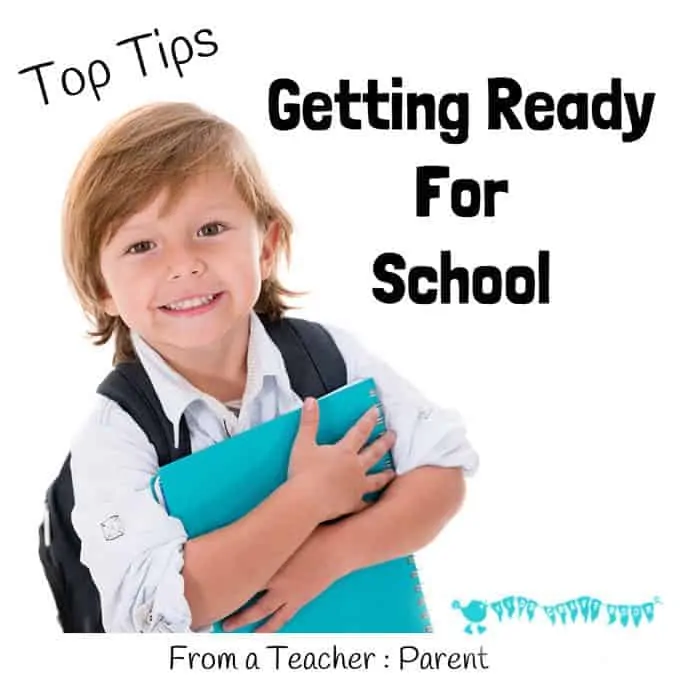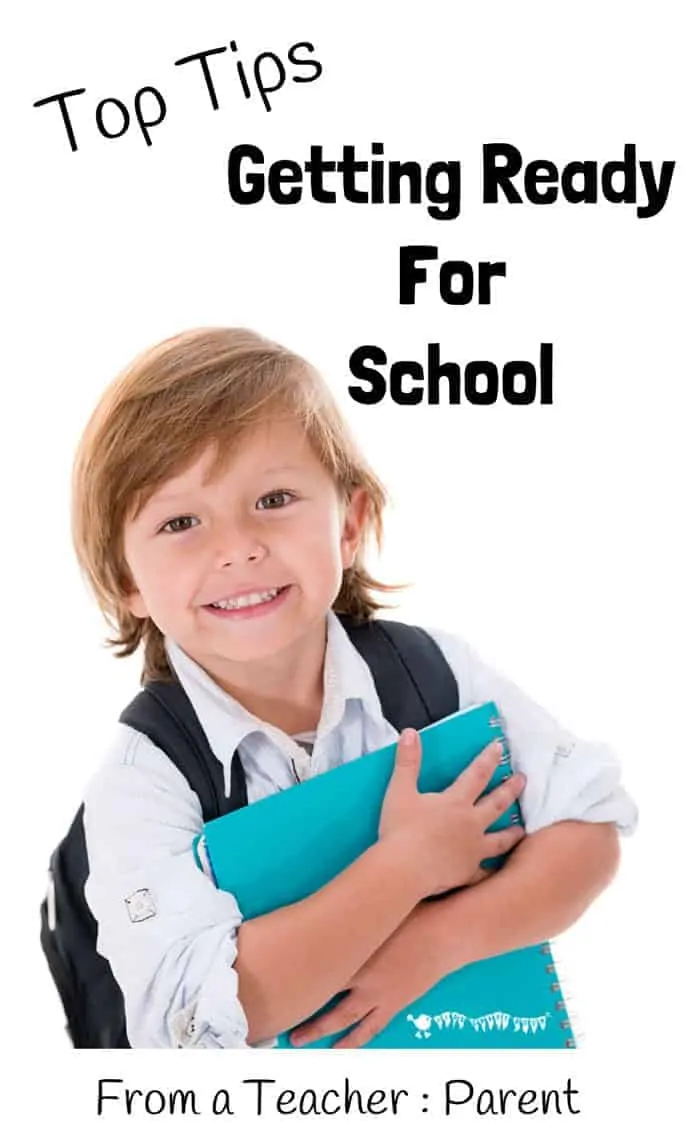Starting school can be an anxious and overwhelming time for our children and for us the parents can’t it?
A little bit of preparation in the weeks before the start date can make getting ready for school much easier and pave the way for a smooth and more stress free transition.
Starting school is a wonderfully exciting adventure to enjoy together and here are some simple tips to support you and your child’s school readiness.
View our other favourite parenting posts here.
Ten Top Tips For Getting Ready for School
1. Start The School Morning Routine A Few Weeks In Advance
Starting school for the first time often means a lot of changes to the morning routine and this can be a difficult adjustment for everyone involved.
It really helps to think about the things that you and your child need to do in the morning, how long they will take to do and the best order to do them. E.g. Do you want to get dressed before or after breakfast? When do you clean your teeth? Do you want to plan in time for a short story or game?
Knowing what order and how much time you’ll need for the morning routine and starting it a few weeks in advance can take away the horrid stress of rushed mornings and enable each school day to start calmly and positively when the time comes.
2. Prepare Your Child With The Independent Toilet And Dressing Skills They’ll Need For Starting School
Your child is no longer going to have your one on one help and the teacher may have up to 30 children to care for on their own. Making sure your child is independent when it comes to toilet time and dressing time is an important part of getting ready for school and can go a long way to helping them feel confident in the new and busy school day.
Spend time in the weeks before starting school giving time for your child to practise and develop those skills every day. Things like buttons, zips, velcro, hoods, socks and shoe buckles can all be tricky for little hands and will need time to master.
3. Wear In The New School Shoes And School Uniform
Getting ready for school can seem particularly strange to a child if they are expected to wear clothes that are different to their norm. It may be that your little one needs to wear a proper uniform, sweatshirt or a sports kit or that you have picked out new clothes especially for the occasion. New clothes, especially shoes, can feel stiff and uncomfortable. Children can feel far more relaxed and like themselves if they’ve had a few wears of those clothes and shoes before the big day.
4. Getting Ready For School Lunches
Lunch time can be an important social time for children and having a lunchbox that they like and can open easily helps them feel confident, independent and is a good talking point for new friendships too. If possible let them choose a lunchbox they love and use it a few times before starting school. Make sure that children can open and close it independently and know how to open the food items inside too, and where to put their rubbish.
Find out from school what their lunchtime policy is and how long children are given to eat. It may be that some foods aren’t allowed or that children are made to always eat their sandwiches first.
Only put in enough food that your child can eat in the given time. If school makes them eat everything in their lunch box before being allowed to play, an over full lunch box can mean they miss out on valuable play and social time.
5. Be Familiar With The Journey To School
Walk or drive the route a few times so you know how long it will take and the best route to go. A few trial runs will take the strangeness of the journey away and give children a good idea of the surroundings and things to look out for and chat about on the way. It’s also a good time to say hello to the crossing patrol and understand road safety rules too.
6. Be Familiar With The Noise Of The Playground
One of the aspects of starting school that you can’t prepare your child for at home is the noise and bustle of the school playground. Some children can find it overwhelming and distressing. It can be really beneficial to walk past the school on a couple of occasions and stop for a few minutes to watch the play. This is a great opportunity to talk with your child about all the exciting games he can see going on and how lots of children together may sound noisy but soon he’ll be joining in and having fun with them too.
7. Is Your Child Confident To Ask Questions At School?
When children first start school they will probably be faced with situations where they don’t fully understand or need more information, such as asking to go to the toilet or where to find the pencil crayons. Children need to feel confident to ask the teacher. An easy way to do this is through small world play together where you take a little control of one of the little characters and act out them starting school and asking some of the questions your child might need to know.
8. Listening and Concentrating At School
Children will be given lots of time for play but still the demands on young children to sit and listen attentively can be quite high and a considerable challenge for many starting school. Giving your children simple activities to develop these skills can be really beneficial, such as listening to a story or completing a jigsaw puzzle quietly at a table. We’ve written a whole article on easily building concentration skills which you can read here.
9. A Token From Home When Starting School
Most settings prefer children not to take in personal items in case of loss or damage but check your individual school’s policy on this. If you have a child that would really benefit from the reassurance of something from home a way around this rule is to sew a small piece of ribbon or soft fabric inside one of your child’s pockets. Give it a loving name like “A Cuddle From Momma Ribbon” and children can hold onto if they are feeling anxious and it connects them to you. We have an article on dealing with separation anxiety here that you might want to look at too.
10. Getting Ready For School – Visit Days
Most schools will have visit days in the build up to starting full time. Our own positive attitude towards these visits can help put children at ease about the transition.
Visiting and staying for a short while on their own helps children familiarise themselves with the new faces they’ll meet, where their classroom is, the teacher’s name, where the toilets are, where to put their coat and lots of small things that will help them feel at ease when they start school full time.
It can be really tough for us to say goodbye for the first time and quite an emotional experience. Help your child feel confident about their new adventure with a big smile and wave and let them know that you are looking forward to hearing all about their visit later.
The setting may also have a time where new parents can meet the staff and ask questions. Take a list of questions you want to ask with you and a pen and paper to jot down the answers.
We hope you’ve found these ten top tips useful. Getting ready for starting school can be a bit daunting and emotional for you and your child can’t it! These simple tips can go a long way to making the transition smooth and enjoyable for you both and pave the way for an exciting new adventure.
Have you shared this article with your friends on Facebook yet?
MORE GREAT PARENTING POSTS:



